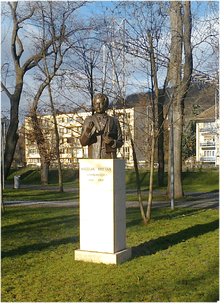Nicolae Bretan
Nicolae Bretan (25 March 1887 – 1 December 1968) was a Romanian opera composer, baritone, conductor, and music critic.

Bretan was born in Năsăud. He studied in Cluj, Vienna and Budapest. His best-known work is the opera Luceafărul (1921) based on a poem by the Romantic poet Mihai Eminescu.
Bretan also composed over 200 lieder.
In 1944, Bretan wife's family, who were Jewish, were transported to the Nazi extermination camp at Auschwitz and murdered.
Refusing to become a member of the Romanian Communist Party in 1948, he was not favoured by the Romanian communist regime, who treated the composer as a "non-person". He died in Cluj, aged 81.
Biography
Nicolae Bretan studied at the Conservatory of Cluj (1906–1908), at the Vienna Academy of Music (1909) and at Magyar Királyi Zeneakademia in Budapest (1912), and after he asserted himself as the first baritone of the Bratislava Opera. In 1916, he received the degree at the Faculty of Philology from Cluj. After he came from Timișoara retreat, he was director at the Hungarian Opera House in Cluj and director of the Romanian Opera House in Cluj.[1]
Major operatic works
- Luceafărul (1921), libretto by Bretan after the 1883 poem of the same name by Mihai Eminescu
- Golem (1924) Golem Lásadása, Oper 1924, after Golem von Illés Kaczér
- Eroii de la Rovine (1935)
- Horia (1937) to libretto by Ghiță Popp
- Arald (1939) after Mihael Eminescu's "Die Geister", premiered 1982 in Iași
- A Különös Széder-est, (1945) premiered 1974
In memoriam
In 2010, 2 composer's busts were inaugurated in Cluj-Napoca. One in front of the Romanian National Opera, with a plaque with the name of Nicolae Bretan and another in front of the Cluj-Napoca Hungarian Opera, carrying an explanatory plaque with the name Bretán Miklós.[2]
In November 2011, at the "Tudor Jarda" Music High School in Bistrita, Nicolae Bretan's bronze bust, made by the artist Ana Rus from Bucharest, was unveiled at the initiative of the daughter of the great musician.[3][4]
In October 2013, another Nicolae Bretan's bust, also the work of the sculptor Ana Rus, was unveiled at the central alley of "Simion Barnuțiu" Park in Cluj, being donated to the city by the composer's daughter, Judit Bretan Le Bovit.[1]
Another Nicolae Bretan's bust is placed at the Iuliu Maniu Square in Alba Iulia, and is standing next to Lucian Blaga's one.
Recordings
- "Luceafărul" (The Evening Star) on Nimbus NI 5463 (1996) (Voineag, Szabó, Casian; Transsylvanian Philharmonic Orchestra/conductor: Béla Hary)
- "Golem" and "Arald" on Nimbus NI 5424 (1995)(Golem: Agache, Dároczy, Sandru, Zancu; Arald: Zancu, Agache, Voineag, Sandru; Moldavian Philharmonic Orchestra/conductor: Christian Mandeal)
- "Horia" on Nimbus NI5513/14 (1997) (Cornelia Pop, Buciuceanu, Fânăţeanu; Bucharest National Opera Choir, Bucharest Opera Orchestra/conductor: Cornel Trailescu) (live recording)
- Requiem (mezzo-soprano, baritone, organ) + selection from "Spiritual Songs" (baritone, piano, organ) on Nimbus NI 5584 (1999)
Sources
- The Oxford Illustrated History of Opera, ed. Roger Parker (1994)
- Booklet accompanying CD of "Golem" and "Arald" (Nimbus NI 5424 (1995))